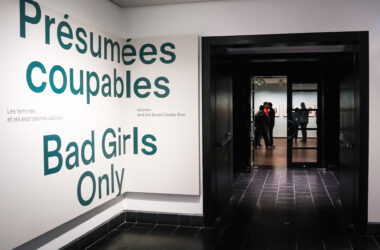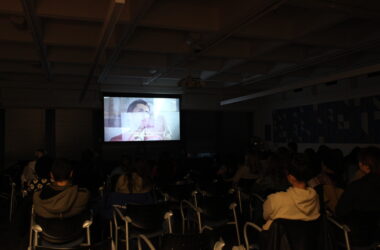From Feb. 6 to 9, audiences at the Théâtre Sainte-Catherine Café-Bar were treated to an intrepid rendition of Cyclops, an ancient Greek play by Euripides. This run of Cyclops was the latest edition of a time-honoured theatrical spectacle: The McGill Classics Play.
Every year since the 2011 staging of Aeschylus’ Agamemnon, McGill students in the Classical Studies department have put their theoretical training into practice by staging an ancient Greek or Roman play. The experience gives students experience with amateur theatre, and an opportunity to engage more directly with their material of study.
This year’s iteration, Cyclops, was directed by Neha Rahman, (U2, Arts), and Daniel Whittle (MA1, Classical Studies). Rahman and Whittle were tasked with more than just directing—they also translated the play from ancient Greek into modern English.
Cyclops is unique in the history of Greek theatre: It is the only “satyr play” with fully intact scripts still available to a modern audience. As Rahman and Whittle explained before the performance, satyr plays were traditionally performed immediately after the conclusion of a Greek tragedy. Narrated by a humorous chorus of satyrs, sexually-frustrated half-horse, half-human figures of Greek mythology, the plays provided a comedic remedy to the weight of the preceding tragedy.
Opening with a lengthy rendition of a Greek folk dance, Cyclops is the humorous retelling of an episode from Homer’s Odyssey, in which Odysseus and his companions are trapped in a cyclops’ cave. In this version, Odysseus, joined by a blundering gang of satyrs sporting exquisite embroidered penises at their waists and played with comic bravado by Anthony Pavoni (BA ‘18). Rahman and Whittle’s lively translation featured hilarious exclamations and exchanges between the characters. One has to wonder how much creative liberty the translators took when, in mortal danger, Odysseus exclaims, “By Hades’ asshole!” The ridiculous nature of the script and story was perfect for the enthusiasm of the amateur cast, who created a truly entertaining spectacle.
Edith Hall, a professor at King’s College London’s visit to McGill enriched the Classics Play further. In her Feb. 8 lecture entitled“Was Cyclops a typical satyr play?”, Hall expanded upon the linguistic debates surrounding the work. She pointed out that, according to ancient sources, a typical satyr play would feature women in primary roles, often escaping capture by the satyrs, whereas Cyclops does not feature any female characters, although in this production many women actors shouldered traditionally male roles.
In an interview with The McGill Tribune, Michaela Drouillard, U2 Arts, the production’s set designer, opened up about the behind-the-scenes drama of Cyclops. In true satyr fashion, the production was dogged by tragicomic events of its own. Three weeks before opening, the actor playing the Cyclops dropped out, and Delaney Dunne (U3 Science), joined the cast just one week to go before the premiere. Meanwhile, another one of the satyrs was not let back into Canada for two weeks due to complications with their student permit. Just like Odysseus himself, the actor made it back eventually, and in the end, the Classics Play was a triumph of entertainment and education.








